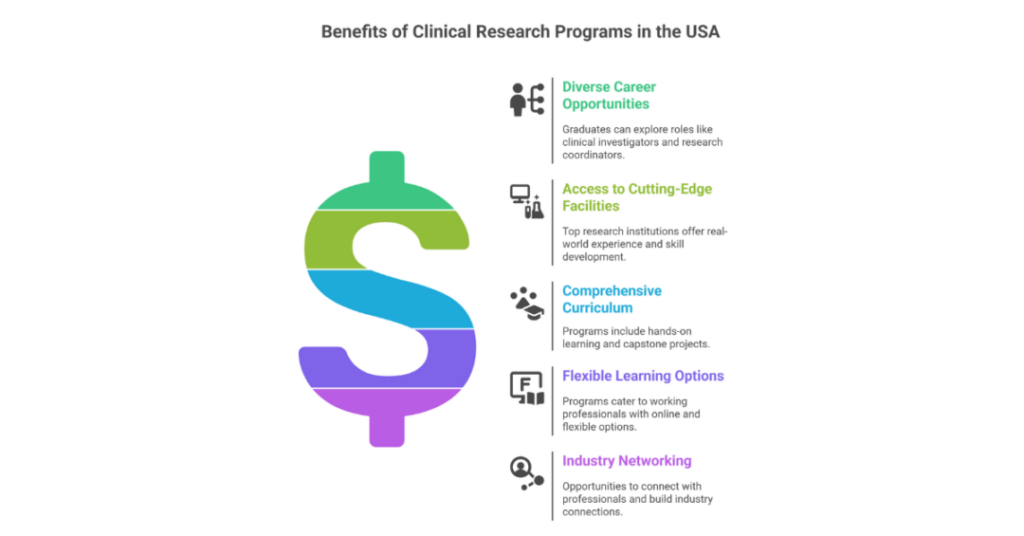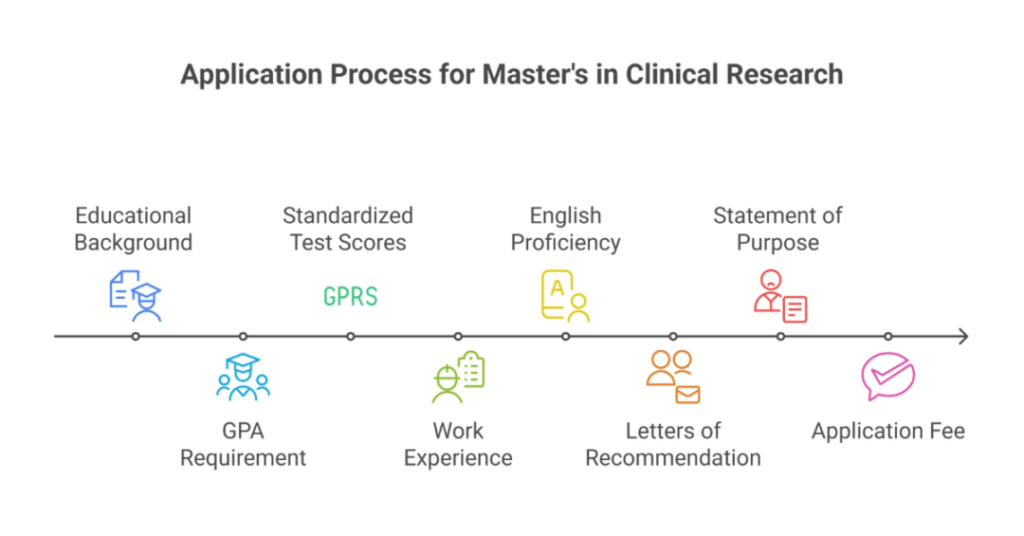2 August 2025
6 minutes read
Masters Of Science In Clinical Research In USA: MS In Clinical Research, Tuition Fees And Universities for Indian Students

Key Takeaways
- Pursuing a clinical research masters in USA equips you with advanced skills to lead clinical studies and drive medical innovation.
- Choosing the right MS degree program with hands-on capstone research and good clinical practice training is essential for career success.
- Graduates gain access to diverse roles in clinical and translational fields, with high earning potential and impactful career opportunities.
You’ve probably never thought about it, but every breakthrough drug or life-saving treatment exists because someone, somewhere, meticulously designed and conducted a clinical trial. Behind the headlines about “medical miracles” are professionals who’ve mastered the art and science of clinical research—and you could be one of them.
But here’s the truth nobody tells you: the path to a career in clinical research is more like a maze than a straight line, filled with confusing options, hefty tuition fees, and programs that may not deliver the real-world skills you need.
The stakes are high. Choose the wrong clinical research program, and you might end up drowning in debt with a degree that doesn’t translate to success in health sciences. But with the right guidance, you can navigate the options, understand what coursework matters (like biostatistics and translational research), and even find flexible part-time or affordable programs. This blog isn’t just about selling a dream—it’s about equipping you with the tools to make it a reality.
Why Pursue Masters Of Science In Clinical Research Program In USA?
Pursuing a Master’s in Clinical Research in the USA is not just about earning a degree—it’s about becoming a clinical research professional at the forefront of healthcare innovation.

With numerous clinical research organizations, academic institutions, and top research facilities, the USA offers unparalleled opportunities in clinical research. Here’s why you should consider pursuing clinical research in the US:
- Diverse Career Opportunities
Graduates of MS programs can pursue roles such as clinical investigators, clinical research coordinators, and research professionals in clinical operations, contract research, and patient-based clinical research tracks. - Access to Cutting-Edge Research Facilities
The USA’s top research institutions provide real-world experience in monitoring clinical studies, site management, and conducting clinical research. You’ll work on research projects like the clinical research management track or translational research track, honing your skills in quantitative methods and data analysis. - Comprehensive Curriculum & Capstone Project
The program consists of hands-on learning in research and clinical environments. Students often complete a research thesis and capstone project, applying knowledge to specific areas of clinical research such as site management organization or clinical research management. - Flexible Learning for Professionals
Programs like the clinical research management program and online program cater to working professionals, allowing you to balance career goals with academic studies. These flexible learning options are ideal for conducting independent research while continuing professional development. - Industry Networking and Career Growth
Through internships and networking events, you’ll connect with program directors, clinical investigators, and research professionals, gaining valuable insights and building industry connections that enhance career opportunities in clinical research.
By pursuing a clinical research degree in the USA, you’ll gain the expertise necessary for a successful career in research and clinical roles, paving the way to impactful contributions in the medical field.
What Clinical Research And Public Health MS Program Is All About?
A Master’s in Clinical Research and Public Health masters program is designed to equip students with the expertise to bridge the gap between investigation and public health impact. Built for individuals with a bachelor’s degree looking to advance their careers, this program combines rigorous training in epidemiology and health services research with practical skills in study design and patient-oriented research.
Related programs have graduated over 150 professionals and offer a curriculum that meets the demands of modern healthcare. Whether you’re pursuing a master’s degree to enhance your qualifications or dive deeper into public health and clinical research, this advanced degree opens doors to impactful roles in both academic and professional settings.
10 Top Clinical Research Universities For Masters In USA
The global clinical trial market is projected to reach over $78 billion by 2030, reflecting the increasing demand for skilled clinical researchers worldwide. In India, the clinical research sector is also experiencing significant growth, offering numerous opportunities for professionals in the field.
Pursuing a Masters degree in Clinical Research from a reputable U.S. university can provide you with advanced knowledge in research methods, data management degrees, and clinical investigations, positioning you for a successful career in this expanding industry.
Below is a table highlighting the 10 top U.S. universities offering MS in Clinical Research programs:
| University | Average Tuition Fees (USD) | Required Exams | Average Salary for Clinical Researchers in the U.S. (USD) |
|---|---|---|---|
| Harvard University | $69,300 per year | GRE, TOEFL/IELTS for international students | $93,149 per year |
| University of California, San Diego | $11,442 per year (in-state); $41,196 (out-of-state) | GRE, TOEFL/IELTS for international students | $93,149 per year |
| Boston University | $56,854 per year | GRE, TOEFL/IELTS for international students | $93,149 per year |
| Drexel University | $36,234 per year | GRE, TOEFL/IELTS for international students | $93,149 per year |
| University of Virginia | $17,076 per year | GRE, TOEFL/IELTS for international students | $93,149 per year |
| Eastern Michigan University | $14,868 per year | GRE, TOEFL/IELTS for international students | $93,149 per year |
| University of Texas Health Science Center | Varies by program | GRE, TOEFL/IELTS for international students | $93,149 per year |
| University of Southern California | $57,256 per year | GRE, TOEFL/IELTS for international students | $93,149 per year |
| Northwestern University | $56,067 per year | GRE, TOEFL/IELTS for international students | $93,149 per year |
| George Washington University | $31,770 per year | GRE, TOEFL/IELTS for international students | $93,149 per year |
What Is The Tuition Fees For MS In Clinical Research And Life Sciences In USA?
Arghhh… this is the only bad thing—huge costs! Pursuing a master’s degree program in clinical research or life sciences in the USA comes with a significant price tag. But before you panic, remember that these programs provide world-class education, a clinical research curriculum designed to prepare you for high-paying roles, and access to industry-leading resources.
Here’s a breakdown of the average costs associated with pursuing a master’s degree program in the U.S.:
| Expense Type | Estimated Cost (USD) |
|---|---|
| Tuition Fees (per year) | $15,000 – $60,000 (varies by university) |
| Living Expenses (housing, food) | $12,000 – $20,000 per year |
| Health Insurance | $1,500 – $3,000 per year |
| Books and Supplies | $1,000 – $2,000 per year |
| Miscellaneous Expenses | $2,000 – $4,000 per year |
Eligibility criteria for master’s in clinical research in the US
To apply for a Master’s in Clinical Research in the US, applicants must meet the following eligibility criteria:

- Educational Background: A bachelor’s degree in life sciences, biology, chemistry, or health-related fields.
- GPA: Typically, a minimum GPA of 3.0–3.5 on a 4.0 scale.
- Standardized Test Scores: GRE scores may be required by some institutions, though many have waived this requirement.
- Work Experience: Relevant work experience in clinical research or healthcare is often beneficial.
- English Proficiency: TOEFL or IELTS scores for non-native English speakers (TOEFL: 80–90, IELTS: 6.5–7.0).
- Letters of Recommendation: Two to three letters from academic or professional references.
- Statement of Purpose: A personal statement outlining motivations and goals.
- Application Fee: Most universities charge an application fee.
What Are The Career Paths After Masters Related To Clinical Research?
After this, there is a possibility that you’re going to lead clinical research studies, contribute to groundbreaking medical device innovations, or even shape global healthcare practices. With a master in clinical research and the research experience you gain, countless doors open in clinical practice, pharmaceutical companies, academic entities, and research facilities.
Here’s a quick overview of some of the most popular career paths and their salary brackets this program offers:
| Role | Salary Range (USD) |
|---|---|
| Clinical Research Associate | $60,000 – $100,000 |
| Clinical Data Manager | $70,000 – $120,000 |
| Clinical Research Coordinator | $50,000 – $85,000 |
| Medical Device Trial Manager | $80,000 – $130,000 |
| Clinical Practice Consultant | $90,000 – $140,000 |
Conclusion
MS degree program in clinical research isn’t just about earning a credential—it’s about becoming a part of a field that drives the future of healthcare. For degree candidates, the journey is demanding, from crafting compelling letters of recommendation to completing capstone research. But the reward is undeniable: the chance to contribute to clinical and translational advancements, analyze data from clinical trials, and uphold good clinical practice standards.
With the right degree from an accredited institution, you’re not just stepping into a career—you’re entering a mission-driven industry that bridges the gap between science and saving lives.
Merge your aspirations with precision using Ambitio’s Shortlist Builder. This tool is designed to bring clarity to your decision-making process, allowing you to create a shortlist that is a true reflection of your highest aspirations.
FAQs
What makes a Master’s in Clinical Research program affordable?
Affordable Master’s in Clinical Research programs prioritize offering quality education at a reasonable cost. They may have lower tuition fees compared to other programs or provide financial aid options such as scholarships, grants, or assistantships to help students manage their expenses.
Can international students receive scholarships for these programs?
Yes, many Master’s in Clinical Research programs offer scholarships specifically designed for international students. These scholarships can help offset the costs of tuition and living expenses, making the program more affordable for international students.
What career opportunities are available after completing a Master’s in Clinical Research?
Completing a Master’s in Clinical Research opens up a range of career opportunities in the field. Graduates can work as clinical research coordinators, data managers, regulatory affairs specialists, or clinical research associates in various settings such as pharmaceutical companies, contract research organizations, academic institutions, and government agencies.
How important is the location of the university for studying clinical research?
The location of the university can have some impact on studying clinical research. Being near research institutions, hospitals, and industry hubs may provide more opportunities for internships, networking, and research collaborations. However, with advancements in technology and remote work possibilities, location is becoming less critical, and the quality of the program and faculty should be the primary considerations.
What are the key factors to consider when choosing a clinical research program?
When choosing a clinical research program, it is important to consider factors such as the program’s accreditation, curriculum, faculty expertise, research opportunities, industry partnerships, internship or practicum experiences, alumni network, and job placement rates. Additionally, factors like cost, location, and the program’s fit with your career goals and research interests should also be taken into account.
What are the prerequisites for enrolling in a Master’s in Clinical Research program?
To enroll in a Master’s in Clinical Research program, applicants typically need a bachelor’s degree in a related field such as biology, chemistry, or health sciences. Some programs may also prefer or require significant work experience in clinical research or healthcare. Prerequisite coursework often includes subjects like biostatistics and research methods.

You can study at top universities worldwide!
Get expert tips and tricks to get into top universities with a free expert session.
Book Your Free 30-Minute Session Now! Book a call now




























